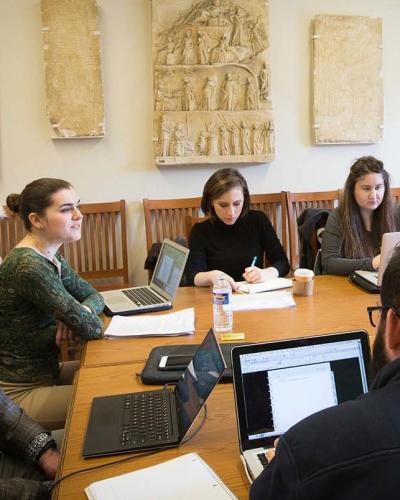CLASS 1800: Classics in the 21st Century: A Guide
What is Classics? Why do we study the Greeks and Romans today? What relevance does classical antiquity have to a world beset by modern-day challenges, especially when veneration of the so-called “Classical Tradition” is associated with elitism, racism, and colonialism? This course is designed for Classics majors and minors to explore the history and contemporary politics of the discipline in a safe and mutually-respectful weekly discussion format. We will read recent discussions of these issues in both scholarly publications and the popular press, making connections with your other courses and seeking to understand them within their cultural and disciplinary context, whilst exploring the many ways in which contemporary classicists are questioning, expanding, and rethinking the scope of the field.
CLASS 2806: Roman Law
This course presents a cultural and historical perspective on ideas of agency, responsibility, and punishment through foundational texts of western law. We will primarily focus on three main areas of law: (1) slavery and (2) family (both governed by the Roman law of persons), and (3) civil wrongs (the law of delict or culpable harm). Through an examination of the legal sources (in translation) and the study of the reasoning of the Roman jurists, this course will examine the evolution of jurisprudence: the development of the laws concerning power over slaves and women, and changes in the laws concerning penalties for crimes. No specific prior knowledge needed.
CLASS 2812: Hieroglyphs to HTML: History of Writing
An introduction to the history and theory of writing systems from cuneiform to the alphabet, historical and new writing media, and the complex relationship of writing technologies to human language and culture. Through hands-on activities and collaborative work, students will explore the shifting definitions of "writing" and the diverse ways in which cultures through time have developed and used writing systems. We will also investigate the traditional divisions of "oral" vs. "written" and consider how digital technologies have affected how we use and think about writing in encoding systems from Morse code to emoji.
CLASS 3616: The Rise and Fall of Julius Caesar, and the Death of the Roman Republic
Julius Caesar is one of the most influential and enigmatic figures in world history. His ruinous overreach forever changed the course of Roman history, and his reform of the calendar is still with us. In this course, students will chart Caesar's rise, fall, and contemporary artistic and philosophical responses to it. Authors include Julius Caesar himself, Cicero, Plutarch, Sallust, Nepos, Lucan, and Shakespeare. All readings are in English.
GREEK 1104: Beginning Homeric Greek
This course offers a ground up introduction to the vocabulary and grammar of Homeric Greek with the goal of reading Homer's Iliad and Odyssey as soon as possible. Once students learn the language of the Iliad and Odyssey, they can move on to other works written in roughly the same formulaic diction, ranging from Hesiod's Theogony to the early philosophical verses of Empedocles and Parmenides. Teaching Beginning Homeric Greek at Cornell, affectionately known as 'baby' Greek, harkens back almost 100 years to the influential and popular courses of Professor Harry Caplan. In fact, this course uses an updated version of the same textbook used in Caplan's beginning Greek courses.





